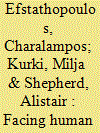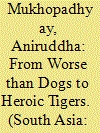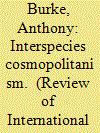|
|
|
Sort Order |
|
|
|
Items / Page
|
|
|
|
|
|
|
| Srl | Item |
| 1 |
ID:
175164


|
|
|
|
|
| Summary/Abstract |
Communities on the planet are faced with complex challenges: changing relations within and between human communities, changing relations with ecological and climatic conditions, and shifts in technology-human interconnections. The complex interconnections across issue areas – migration, environmental degradation and new technologies, for example – demand that scholars increasingly think across theories, paradigms, specialisms and disciplines. But how should we ‘hold things together’ as we try to make sense of complex realities in International Relations (IR)? This introductory article to the Special Issue ‘Facing human interconnections: thinking International Relations into the future’ discusses the open thematic of ‘human interconnections’ that is used to loosely structure the contributions. Analysis of human interconnections, as understood here, does not have a precise or fixed definition but is considered an open-ended notion with varied meanings and dimensions. Indeed, the authors engage it here in varied ways to explore their empirical, theoretical and political concerns. Yet, this notion also allows for interesting new questions to be posed on the potential and limits of IR as it faces the future, and debates around how we see interconnections between issue areas and ‘-isms’, how IR constructs ‘humans’ or ‘non-humans’ in interconnections, and what is at stake in bringing to our attention unacknowledged interconnections. Here we set out why human interconnection is an interesting notion to work with and why we need to keep its meaning open-ended. We also provide an account of six different orientations we observe amongst the authors tackling the dynamics of human interconnections in this Special Issue.
|
|
|
|
|
|
|
|
|
|
|
|
|
|
|
|
| 2 |
ID:
181337


|
|
|
|
|
| Summary/Abstract |
Dalit autobiographies narrate the journey of protagonists from the ‘untouchable’ communities of India towards self-realisation and their struggle for human rights. A vigilant reading recognises the representation of animals as tropes in Dalit autobiographies that trace the reconstitution of the non-human limit of the Dalit as narrative subject. This paper reads Dalit autobiographies by Narendra Jadhav, Bama and Namdeo Nimgade to reveal the importance of animals as an analogy in Dalit literature, but then, following the work of Spivak and Derrida, it deconstructs the circulation of the hegemonic logic of the rational humanist subject in the radical gesture of Dalit subject constitution.
|
|
|
|
|
|
|
|
|
|
|
|
|
|
|
|
| 3 |
ID:
193305


|
|
|
|
|
| Summary/Abstract |
Cosmopolitanism claims to be the most just and inclusive of mainstream approaches to the ethics and practice of world order, given its commitment to human interconnection, peace, equality, diversity, and rights, and its concern with the many globalised pathologies that entrench injustice and vulnerability across borders. Yet it has largely remained oblivious to the agency, power, and value of non-human life on a turbulent and active Earth. Without rejecting its commitments to justice for human beings, the article challenges its humanism as both morally and politically inadequate to the situation of the Anthropocene, exemplified by the simultaneous crises of climate change, mass extinction, and the COVID-19 pandemic. In answer, the article develops new grounds and principles for an interspecies cosmopolitanism, exploring how we can reimagine its ontological foundations by creating new grounding images of subjectivity, existential unity, institutional organisation, and ordering purpose. These, in turn, can support political and institutional projects to secure the rights of ecosystems and people to flourish and persist through an increasingly chaotic epoch of human dominance and multispecies vulnerability across the Anthropocene Earth.
|
|
|
|
|
|
|
|
|
|
|
|
|
|
|
|
|
|
|
|
|